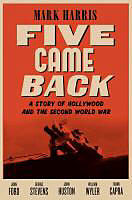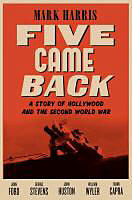Five Came Back
Einband:
Fester Einband
EAN:
9781594204302
Untertitel:
A Story of Hollywood and the Second World War
Genre:
Geschichte
Autor:
Mark Harris
Herausgeber:
Random House N.Y.
Anzahl Seiten:
528
Erscheinungsdatum:
01.10.2014
ISBN:
978-1-59420-430-2
Looks at the World War II experiences of five legendary directors--John Ford, William Wyler, John Huston, Frank Capra, and George Stevens--to assess the transformative impact of the war and period beliefs on Hollywood.
Leseprobe
ONE
“The Only Way I Could Survive”
HOLLYWOOD, MARCH 1938–APRIL 1939
In the spring of 1938, Jack Warner hosted an industry dinner for the exiled novelist Thomas Mann. A Nobel laureate whose outspoken opposition to Hitler and his policies had led to the revocation of his German citizenship, Mann was then Germany’s leading anti-Nazi voice in the United States. His presence at a Hollywood event was, if not a call to arms, at least a call to wallets. It was also a political coming-out of sorts for Warner and his older brother Harry, who, just three weeks after the Anschluss, were ready to commit themselves—and, more significantly, the company they and their brothers Albert and Sam had founded in 1923—to the fight against the Nazis. The day before the dinner, the studio had shut down its offices in Austria. It had stopped working with Germany four years earlier.
The fact that Warner Bros. was at the time the only studio to take such a step suggests the extreme uneasiness that characterized the behavior of the men, almost all of them Jewish, who ran Hollywood’s biggest companies. Freewheeling and entrepreneurial within the confines of the industry they had helped to create, they approached politics only haltingly and after agonized deliberation. While bottom-line imperatives were unquestionably a part of their calculus, their trepidation also emanated from an accurate understanding of their fragile place in American culture; to confront any national or international issue that might turn the spotlight on their religion was to risk animosity and even censure. The motion-picture business was still just thirty years old; most of the people who had built it were first- or second-generation Americans who were still viewed warily by the large portion of the country’s political power structure—to say nothing of the press and public—that had in common a tacit and sometimes overt anti-Semitism. The moguls knew they were perceived as arrivistes and aliens whose loyalties might be divided between the adoptive nation that was making them wealthy and their roots in their old homelands.
As Hitler consolidated his power in the 1930s, studio chiefs tended to express their Jewish identity in personal, one-on-one appeals and in the quiet writing of checks to good causes, not in speeches or statements, and certainly not in the movies they oversaw. Mostly, they stayed quiet; the decorous country-club discretion of MGM’s Louis B. Mayer was much more the norm than the recent behavior of the Warners (real name: Wonskolaser), Jewish immigrants from Poland who didn’t tiptoe around their hatred of Fascism and of Hitler and were increasingly unafraid to go public and to use their position to influence others. The Warners were ardently pro-Roosevelt (unlike most of the other studio czars, who were business-minded antilabor Republicans), and Harry, who was the eldest and very much the voice of his studio, had recently urged all of his employees to join the Hollywood Anti-Nazi League for the Defense of American Democracy, the movie industry’s first and strongest anti-Hitler rallying and fund-raising organization.

Leider konnten wir für diesen Artikel keine Preise ermitteln ...
billigbuch.ch sucht jetzt für Sie die besten Angebote ...
Die aktuellen Verkaufspreise von 6 Onlineshops werden in Realtime abgefragt.
Sie können das gewünschte Produkt anschliessend direkt beim Anbieter Ihrer Wahl bestellen.
Loading...
Die aktuellen Verkaufspreise von 6 Onlineshops werden in Realtime abgefragt.
Sie können das gewünschte Produkt anschliessend direkt beim Anbieter Ihrer Wahl bestellen.
| # | Onlineshop | Preis CHF | Versand CHF | Total CHF | ||
|---|---|---|---|---|---|---|
| 1 | Seller | 0.00 | 0.00 | 0.00 |
